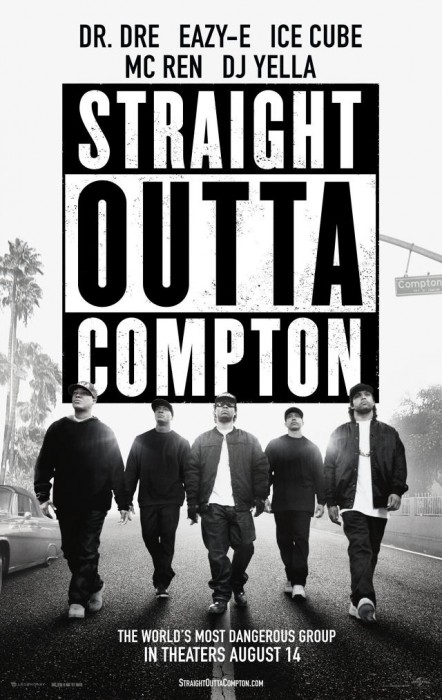Mostly famous for co-producer Ice Cube’s comedy classic Friday, you can tell how much affection Straight Outta Compton‘s director F. Gary Gray has for his subject matter. Just as a musical biopic, narratively the film isn’t especially groundbreaking, but his attention to detail more than makes up for it. He certainly takes his time as it’s well over 140 minutes- the scope of the movie gradually begins to expand its view to include a rough early history of gangsta rap, and major names like a young Snoop Dogg and Tupac appear in brief cameos. Still, the story is through the viewpoint of the members of N.W.A, and thanks to some strong performances it doesn’t start to feel tedious.
I’ve always thought of N.W.A as an American equivalent to the U.K’s Sex Pistols in terms of projecting a brutal honesty in their music as well as their impact on pop culture at large, not to mention their continued resonance. The more glam influenced Wrecking Cru DJ Alonzo Williams (Corey Reynolds) can’t see the potential in Dr Dre (Corey Hawkins), his friends Eazy-E (Jason Mitchell), Ice Cube (O’Shea Jackson, Jr.), MC Ren (Aldis Hodge) or even the initially more reluctant DJ Yella’s (Neil Brown, Jr.) more topical and aggressive sound, and he becomes brief comedy relief along the way as the group inevitably rockets upward. Much like punk rock, their lyrics are a welcome release both for them and their burgeoning L. A scene, but unlike its fear of flaunting success, N.W.A embraced it as a clear exclamation point and statement, redefining the idea of a rock star forever.
Even as their environments, tastes and artistic visions transform, refreshingly the script tries to be fair to the perspectives of the band members, portraying their inner strife in something of a balanced manner, while also capturing their friendship and connection without deifying or sugarcoating them. Their manager Jerry Heller (Paul Giamatti) is shown as a tragic villain who’s convinced he can help his clients while still playing an underhanded Hollywood game, which of course backfires as the band isn’t any more compromising than their music is.
During the actual recording of their debut album he bristles with anger as a mixed group of police officers harass and disparage them, inspiring that family friendly classic “Fuck Tha Police”, but also throws emotional tantrums when the group picks up on his dishonesty. Nevertheless Eazy’s relationship with Heller proves to be a rift, a sign of the insecurity behind the bravado that Jason Mitchell puts forth in his performance. As another of the film’s co-producers, Dr. Dre often looks like the adult in the room, trying to keep his vision on the music as opposed to the ego, but Hawkins gives him an honest likability that keeps him from looking like a Mary Sue. Jackson Jr. for his part does a great job capturing his father’s attitude, passion and humor.
Even though the film is upfront about the group’s divisions (especially in a scene when the remaining members listen to Ice Cube’s diss song “No Vaseline”, which is mostly played for some good laughs) and doesn’t gloss over too many of their controversies, Straight Outta Compton is mostly affectionate towards its major players, with the exception of Suge Knight (R. Marcus Taylor), dressed and shot by cinematographer Matthew Libatique as a devil analogy wearing devilishly red outfits, against burgundy interiors and riding in bright crimson cars. It’s an interesting style choice among a number of other strong sequences, also including an exciting open when Eazy stands up to some bigger drug dealers and later when N.W.A thumb their nose at law enforcement and set forth a riot to perform their most infamous song.
It’s sprawling but always intense, so I can recommend it to long time fans and newcomers to either them or just hip-hop in general. If nothing else, Gray definitely captures how aware N.W.A were of the effect they were having on America at large. The snowball of controversy and subsequent artistic revolution almost feels too apt, and perhaps inevitable when Heller first approaches Eazy shortly after founding Ruthless Records and mentions various classic rock icons he’s worked with- all inarguably great, but E can only reply with a puzzled look and ask, “Have you listened to anybody from this decade?”



